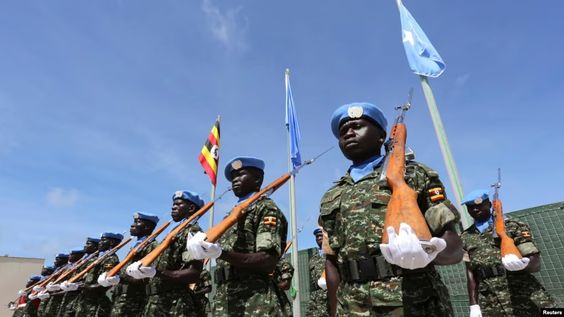Africa
Uganda Reports 54 Peacekeeper Deaths in Somali Jihadist Attack

Last week, militants besieged an African Union base in Somalia, killing approximately 54 Ugandan peacekeepers, according to Ugandan President Yoweri Museveni. This was one of the deadliest assaults by Al-Shabaab extremists in the war-torn country in recent memory.
“We discovered the lifeless bodies of 54 fallen soldiers, including a commander,” Museveni wrote late Saturday on Twitter.
The veteran leader was speaking during a meeting with members of his ruling National Resistance Movement party, according to a Sunday report by AFP.
The death toll is one of the highest since pro-government forces supported by the African Union force known as ATMIS launched an offensive against Al-Shabaab last August.
It was also an uncommon acknowledgment by African Union members of a substantial number of military fatalities.
Al-Shabaab, which has waged a bloody insurgency against Somalia’s fragile central government for more than a decade, claimed responsibility for the attack on May 26, stating that it had overwhelmed the base and murdered 137 soldiers.
Al-Shabaab is known to exaggerate battlefield victories for propaganda purposes, and governments of nations contributing personnel to the African Union force rarely corroborate casualties.
The militants drove an explosives-laden vehicle into the base in Bulo Marer, 120 kilometers (75 miles) southwest of the capital Mogadishu, triggering a firefight, according to local residents and a Somali military commander quoted by AFP.
Museveni had stated the previous week that “some of the soldiers there did not perform as expected and panicked” when some 800 attackers attacked.
This resulted in a withdrawal to a nearby base approximately 9 kilometers (6 miles) away, he said, lamenting “a missed opportunity to annihilate” the Qaeda-affiliated insurgents.
“The error was made by two commanders, Majors Oluka and Obbo, who ordered the soldiers to retreat,” Museveni said on Saturday, adding that they would be tried by a court martial.
However, “our soldiers exhibited remarkable resiliency and reorganized themselves, resulting in the base’s recapture.”
After the pre-dawn assault, ATMIS reportedly dispatched helicopter gunships as reinforcements, though it has not yet disclosed the number of fatalities.
The United States also stated that it conducted an airstrike near the base one day after its initial attack.
The U.S. Africa Command stated that it “destroyed weapons and equipment unlawfully taken by Al-Shabaab fighters” without specifying when or where the weapons were stolen.
“Total warfare”
As the country struggles to emerge from decades of conflict and natural disasters, the assault highlights the country’s endemic security problems.
President Hassan Sheikh Mohamud of Somalia declared a “all-out war” against Al-Shabaab in 2012, mobilizing Somalis to help root out members of the jihadist organization, which he referred to as “bedbugs.”
In recent months, the army and “macawisley” militias have recaptured large swaths of territory in the country’s center, aided by U.S. airstrikes and ATMIS.
Nevertheless, despite the advances made by pro-government forces, militants have continued to use lethal force against civilian and military targets.
In October, 121 persons were murdered in two vehicle bomb explosions at the education ministry in Mogadishu, in the deadliest Al-Shabaab attack since the offensive began.
A high-ranking Burundian military officer told AFP that the militants assaulted an AU base in May 2022, triggering a fierce combat that resulted in the deaths of approximately 30 Burundian peacekeepers.
The Somali government and the African Union condemned the attack, but did not reveal the number of fatalities.
Al-Shabaab fighters overran a military base southwest of Mogadishu in September 2015, killing at least 50 African Union soldiers, according to Western military sources.
The ATMIS force of 20,000 personnel has a more offensive mandate than its antecedent, AMISOM.
It is comprised of soldiers from Uganda, Burundi, Djibouti, Ethiopia, and Kenya, and is stationed in southern and central Somalia.
It aims to pass over security responsibilities to Somalia’s army and police by 2024.
In a February report to the U.N. Security Council, Antonio Guterres stated that 2022 was the deadliest year since 2017 for civilians in Somalia, primarily due to Al-Shabaab attacks.
